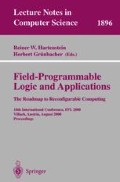Abstract
Multidimensional arrays are among the most common data types. Their use in configurable hardware requires the injective translation of the index tuple into a memory address. This problem is considered in the paper, searching for a balance between speed and waste of memory. The basic idea is to divide one of the index ranges such that one part is a power of two. In this way the indices can be concatenated with fewer loss. To combine both resulting parts into one memory, several techniques are used.
The integration of the proposed method into libraries and tools allows efficient description of algorithms on a higher abstraction level.
Access this chapter
Tax calculation will be finalised at checkout
Purchases are for personal use only
Preview
Unable to display preview. Download preview PDF.
References
Actel Corporation. ProASIC 500K Family Datasheet, advanced v.3 edition, December 1999.
Altera Corporation. APEX 20K Programmmable Logic Device Family, November 1999.
Andreas Gieriet. Re: Indexing functions. Usenet Newsgroup contribution, January 2000. http://comp.lang.vhdl,comp.lsi,comp.arch.fpga.
R.W. Hartenstein, M. Herz, T. Hoffmann, and U. Nadeldinger. Exploiting contemporary memory techniques in reconfigurable architectures. In Field Programmable Logic and Applications’ 98, number 1482in LNCS, pages 189–198. Springer, 1998.
John D. Lipson. Elements of Algebra and Algebraic Computing. Addison Wesley, 1981.
Herman Schmit and Donald E. Thomas. Address generation for memories containing multiple arrays. In Proceedings of the 1995 IEEE/ACM international conference on Computer-aided design, pages 510–514, 1995.
Herman Schmit and Donald E. Thomas. Address generation for memories containing multiple arrays. IEEE Transactions on Computer-Aided Design of Integrated Circuits and Systems, 17(5):377–385, May 1998.
Steven J. E. Wilton, Jonathan Rose, and Svonko G. Vranesic. The memory/logic interface in fpga’s with large embedded memory arrays. IEEE Transactions on Very Large Scale Integration Systems, 7(1):80–91, March 1999.
XILINX Inc. Virtex-E Field Programmable Gate Arrays, January 2000.
Author information
Authors and Affiliations
Editor information
Editors and Affiliations
Rights and permissions
Copyright information
© 2000 Springer-Verlag Berlin Heidelberg
About this paper
Cite this paper
Döring, A.C., Lustig, G. (2000). Generating Addresses for Multi-dimensional Array Access in FPGA On-chip Memory. In: Hartenstein, R.W., Grünbacher, H. (eds) Field-Programmable Logic and Applications: The Roadmap to Reconfigurable Computing. FPL 2000. Lecture Notes in Computer Science, vol 1896. Springer, Berlin, Heidelberg. https://doi.org/10.1007/3-540-44614-1_67
Download citation
DOI: https://doi.org/10.1007/3-540-44614-1_67
Published:
Publisher Name: Springer, Berlin, Heidelberg
Print ISBN: 978-3-540-67899-1
Online ISBN: 978-3-540-44614-9
eBook Packages: Springer Book Archive

